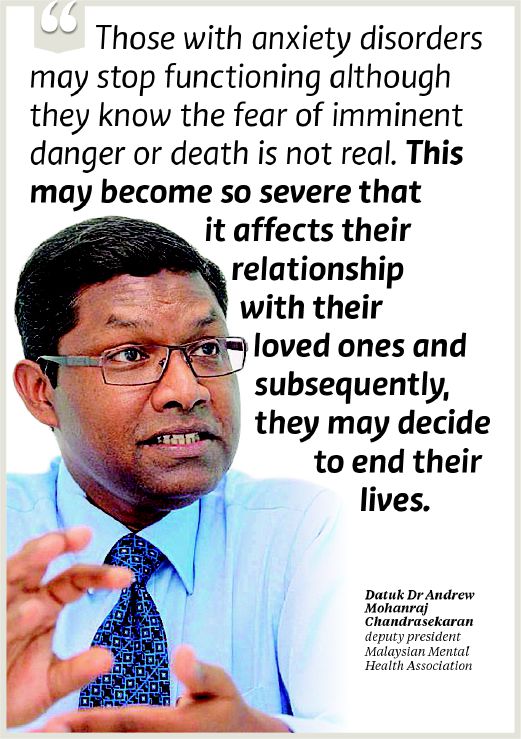
KUALA LUMPUR: Early detection of poor mental health and early treatment are important to prevent further complications and the higher risk of developing mental illnesses, said Malaysian Mental Health Association deputy president Datuk Dr Andrew Mohanraj Chandrasekaran.
He said a significant number of Malaysians suffered from some form of psychological distress, but might not realise they were facing such problems.
Failure to treat the problem at an early stage or if left untreated, he said, could lead to disastrous consequences for one’s self and to the society.
“Globally, one in five adults will suffer from one episode of depression in their lifetime and those suffering from depression may become suicidal.
“Those with anxiety disorders may stop functioning although they know the fear of imminent danger or death is not real.
“This may become so severe that it affects their relationship with their loved ones and subsequently, they may decide to end their lives.
“Those with schizophrenia, if untreated, may suffer from psychosis-like delusions and hallucinations that might make them homicidal or suicidal.
“Statistically, about 30 per cent of those with schizophrenia will attempt suicide at least once in their lifetime.
“Some of the bizarre cases of homicide and suicide reported in the press were likely to be due to the key players suffering from psychosis,” Dr Andrew told the New Straits Times.
NST yesterday reported that one in three Malaysians has mental health issues, with many failing to address the problem for fear of being labelled “mentally ill”.
Dr Andrew said the figures quoted in the National Health and Morbidity Survey 2015 were alarming, whereby 29.2 per cent of adults were said to be suffering from poor mental health.
He said most mental illness or psychological distress could be effectively treated and were often situational, and only a small percentage of mental illness could be long term and debilitating.
The current approach in the management of most mental illnesses was the “Bio-Psycho-Social” model, he said.
“Bio” refers to the biological or medication prescribed, where in some cases, this might be long term, like medications for diabetes or hypertension, while the second component is the psychological aspect, where counselling or psychotherapy would be given.
“This is particularly useful in depression. In anxiety disorders including phobias, cognitive behavioural therapy has been found to be useful,” said Dr Andrew.
The third and final component is the influence of social factors, in which some changes in the family or work environment might be necessary.
Dr Andrew said anti-depressants belonging to the selective serotonin re-uptake inhibitor (SSRI is the most commonly prescribed anti-depressants) group, which maintains the necessary levels of serotonin in the brain was found to be useful in combating depression.
“People with depression and anxiety can benefit from psychotherapy.
“It cannot make their stressful problems go away, but it can make the person look at his adversity in a different or positive way.”
Dr Andrew said music therapy has been found to be helpful in battling stress or mild depression.
“Physical exercises, including using stress ball, were found to be helpful.
“Any form of exercise will cause the release of endorphins in the body which helps elevate the mood.”
Dr Andrew said it was common for a
person suffering from one type of mental illness like depression, bipolar disorder, schizophrenia or even personality disorders to abuse drugs or alcohol as a means to make them feel “calm”.
“The feeling of calmness is temporary.
“Due to repeated abuse of a particular substance, the person soon develops an addiction or a more severe dependency on that particular substance.
“This will eventually result in dual diagnosis or the emergence of a second mental illness.
“In some cases, even without an existing mental illness, continuous use of drugs, like marijuana or methamphetamines, can lead to permanent psychosis resembling schizophrenia.
“Alcohol dependency can lead to permanent personality changes and other physical complications that can be fatal.”
Dr Andrew said society could play a role in reducing stigma and discrimination against those with mental illness.
“As the saying goes, prevention is better than cure.
“Coping skills must be taught to school children, particularly to those with symptoms of stress and anxiety.
“This will help prevent the onset of depression later in adult life,” he added.
